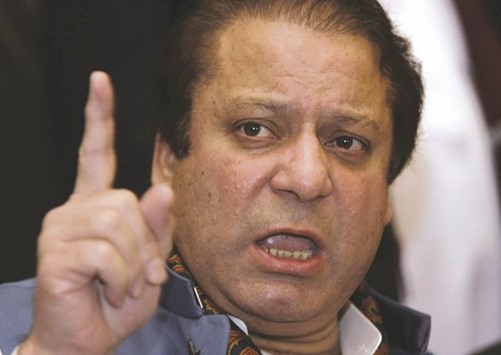Pakistan yesterday pledged further action to combat militants, but Prime Minister Nawaz Sharif admitted progress had often been slow, speaking just days after a deadly attack by heavily armed gunmen on a university campus killed 21 people.
The assault bore a chilling resemblance to the December 2014 Peshawar school assault in which more than 150 people, mostly children, were killed, prompting the government to launch a National Action Plan (NAP) cracking down on extremism.
Sharif said yesterday Pakistan would continue the fight against militants.
“We will fulfil this responsibility,” he told reporters in London.
“In certain areas of NAP the progress is slow, but in many other areas work has been started,” Sharif added.
The NAP saw the creation of military courts and the resumption of executions after a six-year moratorium, and the initiatives were credited with making 2015 the least deadly in terms of militant attacks since the formation of the Tehreek-e-Taliban Pakistani (TTP) in 2007.
The Pakistan military also intensified an ongoing campaign against extremism following the 2014 assault.
Sharif said that Pakistan and Afghanistan had an agreement that both countries would not allow militants to use their territory to launch attacks on their neighbour.
However, Pakistan officials said the university attack was orchestrated from Afghanistan and that they have arrested five Pakistani facilitators.
“Pakistan and Afghanistan are strictly following this agreement, but there are certain elements in Afghanistan who on their own are attacking Pakistan,” Sharif said.
“In 2014 our school was attacked from Afghanistan. Such attacks should be stopped,” Sharif said.
Twenty-one people were killed last Wednesday in an attack at a university campus in Pakistan’s tribal northwest which was claimed by a faction of the Pakistani Taliban, barely a year after the massacre at a school in Peshawar that killed more than 150 people.
Earlier this month Sharif assured US Secretary of State John Kerry that Pakistan was investigating the deadly attack on an Indian air force base.
Indian officials suspect the January 2 attack on the Pathankot base, which left seven soldiers dead, was carried out by the banned Pakistan-based group Jaish-e-Mohamed.
Meanwhile, US President Barack Obama has praised recent crackdowns by Pakistani security forces on extremists but said more should be done to eradicate violent groups
In an interview with the Press Trust of India published yesterday, Obama urged Pakistan to show it is “serious” about crushing extremist networks operating on its territory, saying the latest mass killing of students underlined the need for more decisive action.
“Pakistan has an opportunity to show that it is serious about delegitimising, disrupting and dismantling terrorist networks,” Obama told the news agency in Washington.
“In the region and around the world, there must be zero tolerance for safe havens and terrorists must be brought to justice.”
A military offensive against extremists in Pakistan’s tribal areas was intensified after the Peshawar attack, although Indian officials say authorities across the border still turn a blind eye to jihadist groups.
Obama said the crackdown on extremists was “the right policy” but was quoted as saying that Pakistan “can and must” take more effective action.
“Since then (Peshawar), we have seen Pakistan take action against several specific groups,” said Obama.
“We have also seen continued terrorism inside Pakistan such as the recent attack on the university in northwest Pakistan.”
Obama said that attack in Punjab was “another example of the inexcusable terrorism that India has endured for too long”.
The attack came only days after Indian Prime Minister Narendra Modi had paid his first visit to Pakistan, dropping in for talks with his counterpart Nawaz Sharif on his way home from Afghanistan.
Modi has resisted pressure to put ties with Pakistan back in deep freeze after the air base attack, and Obama endorsed the continuation of contacts.
“Both leaders are advancing a dialogue on how to confront violent extremism and terrorism across the region,” Obama said.

Nawaz Sharif
